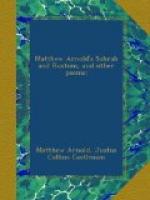=Arnold’s Poetic Culture=.—Obviously, the sources of Arnold’s culture were classical. As one critic has tersely said, “He turned over his Greek models by day and by night.” Here he found his ideal standards, and here he brought for comparison all questions that engrossed his thoughts. Homer (he replied to an inquirer) and Epictetus (of mood congenial with his own) were props of his mind, as were Sophocles, “who saw life steadily and saw it whole,” and Marcus Aurelius, whom he called the purest of men. These like natures afforded him repose and consolation. Greek epic and dramatic poetry and Greek philosophy appealed profoundly to him. Of the Greek poets he wrote: “No other poets have lived so much by the imaginative reason; no other poets have made their works so well balanced; no other poets have so well satisfied the thinking power; have so well satisfied the religious sense.” More than any other English poet he prized the qualities of measure, proportion, and restraint; and to him lucidity, austerity, and high seriousness, conspicuous elements of classic verse, were the substance of true poetry. In explaining his own position as to his art, he says: “In the sincere endeavor to learn and practise, amid the bewildering confusion of our times, what is sound and true in poetic art, I seem, to myself to find the only sure guidance, the only solid footing, among the ancients. They, at any rate, knew what they wanted in Art, and we do not. It is this uncertainty which is disheartening, and not hostile criticism.” And again: “The radical difference between the poetic theory of the Greeks and our own is this: that with them, the poetical character of the action in itself, and the conduct of it, was the first consideration; with us, attention is fixed mainly on the value of separate thoughts and images which occur in the treatment of an action. They regard the whole; we regard the parts. We have poems which seem to exist merely for the sake of single lines and passages, and not for the sake of producing any total impression. We have critics who seem to direct their attention merely to detached expressions, to the language about




